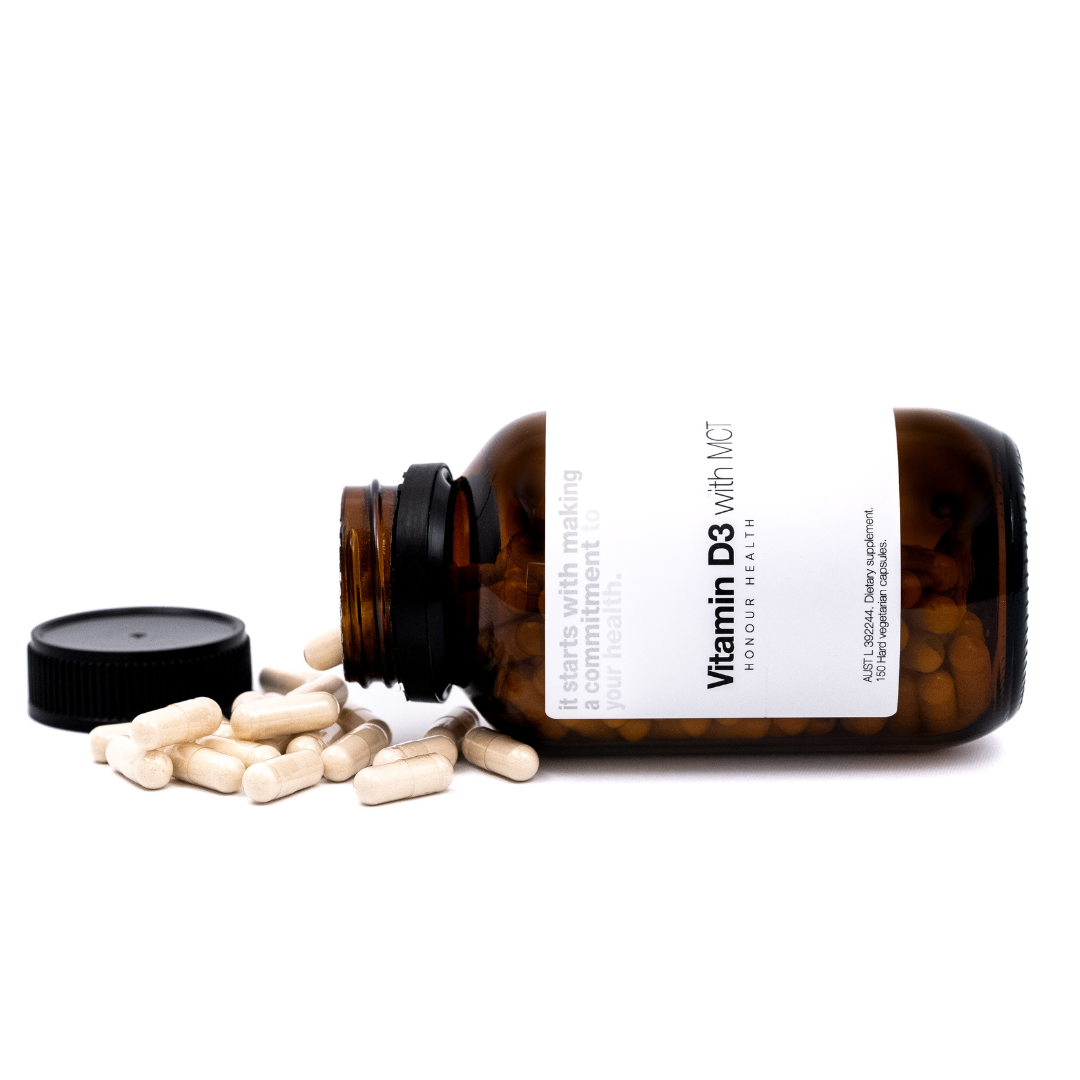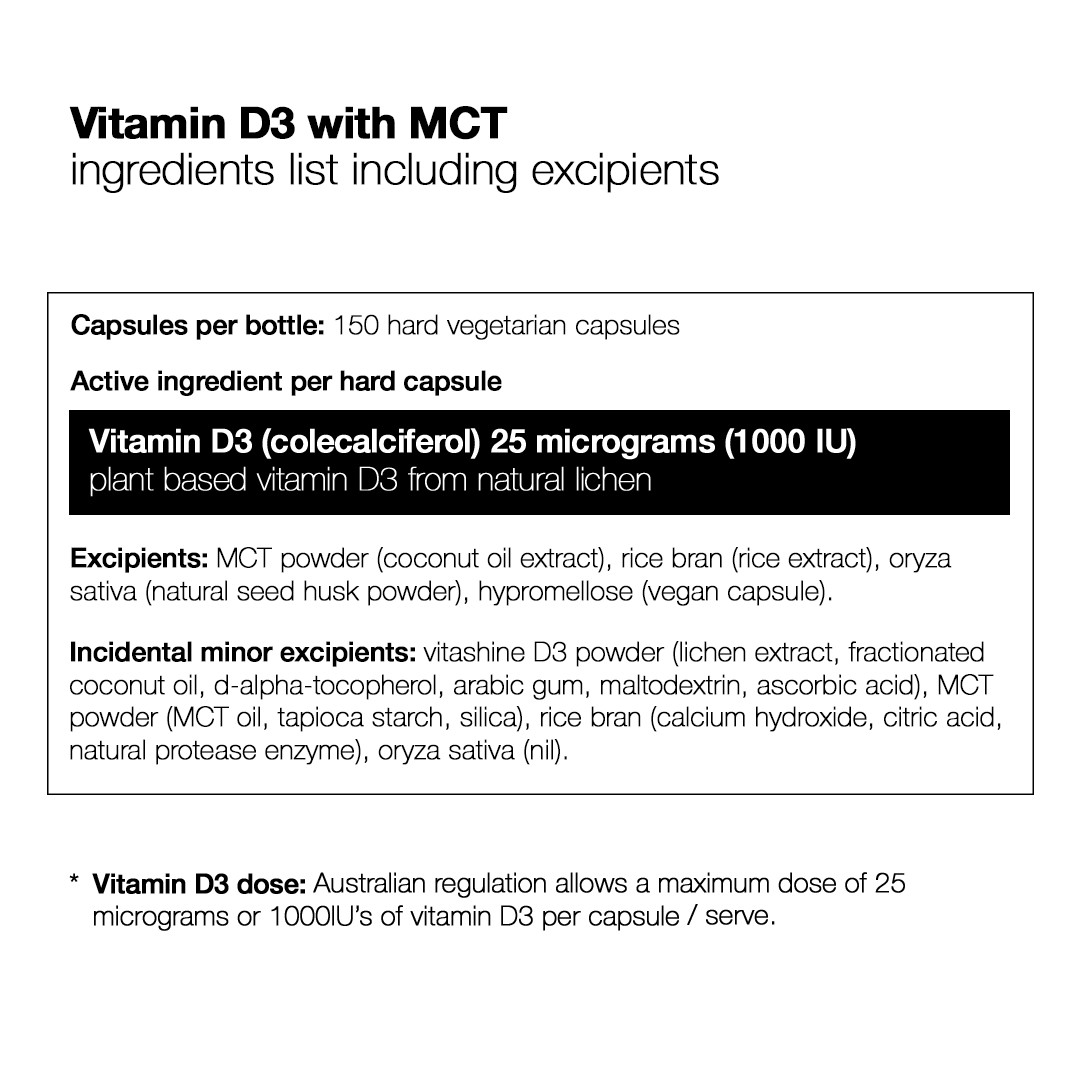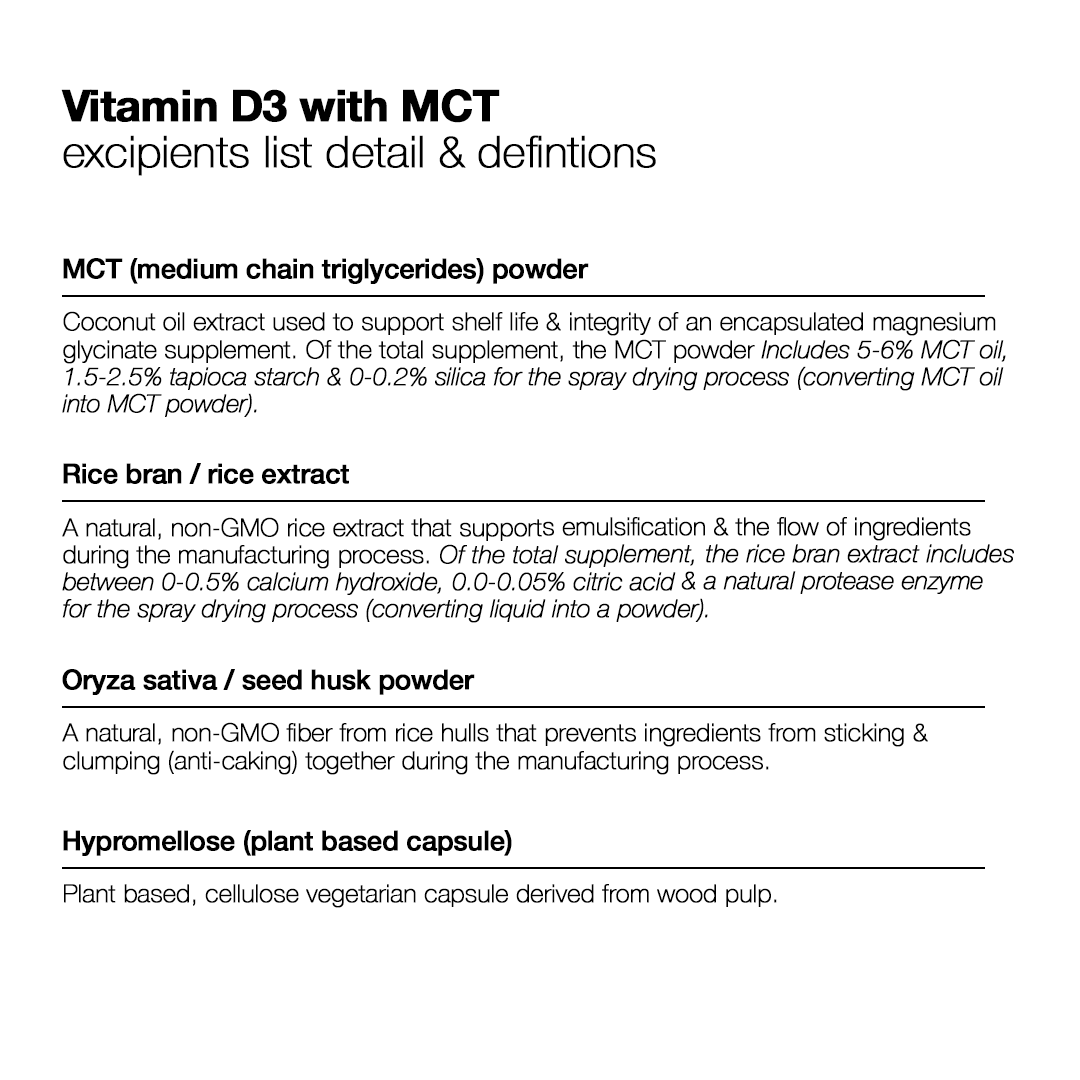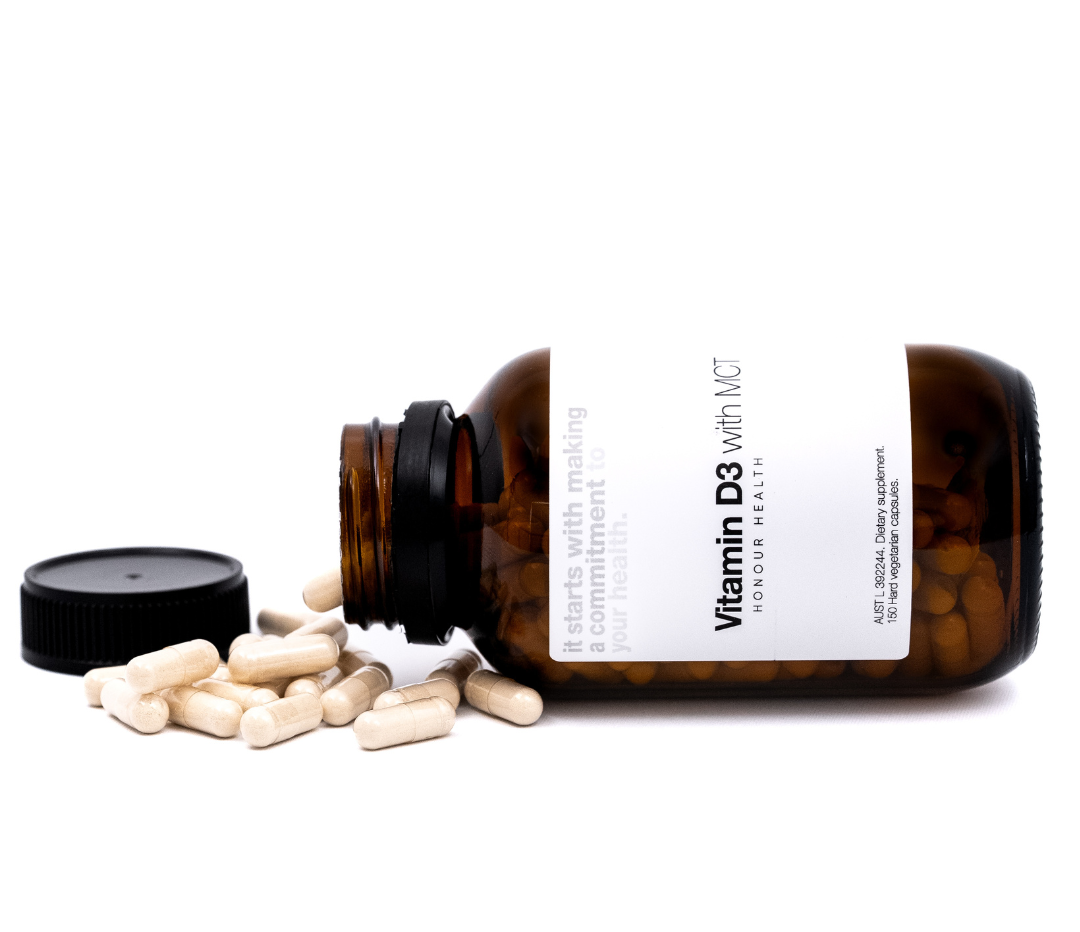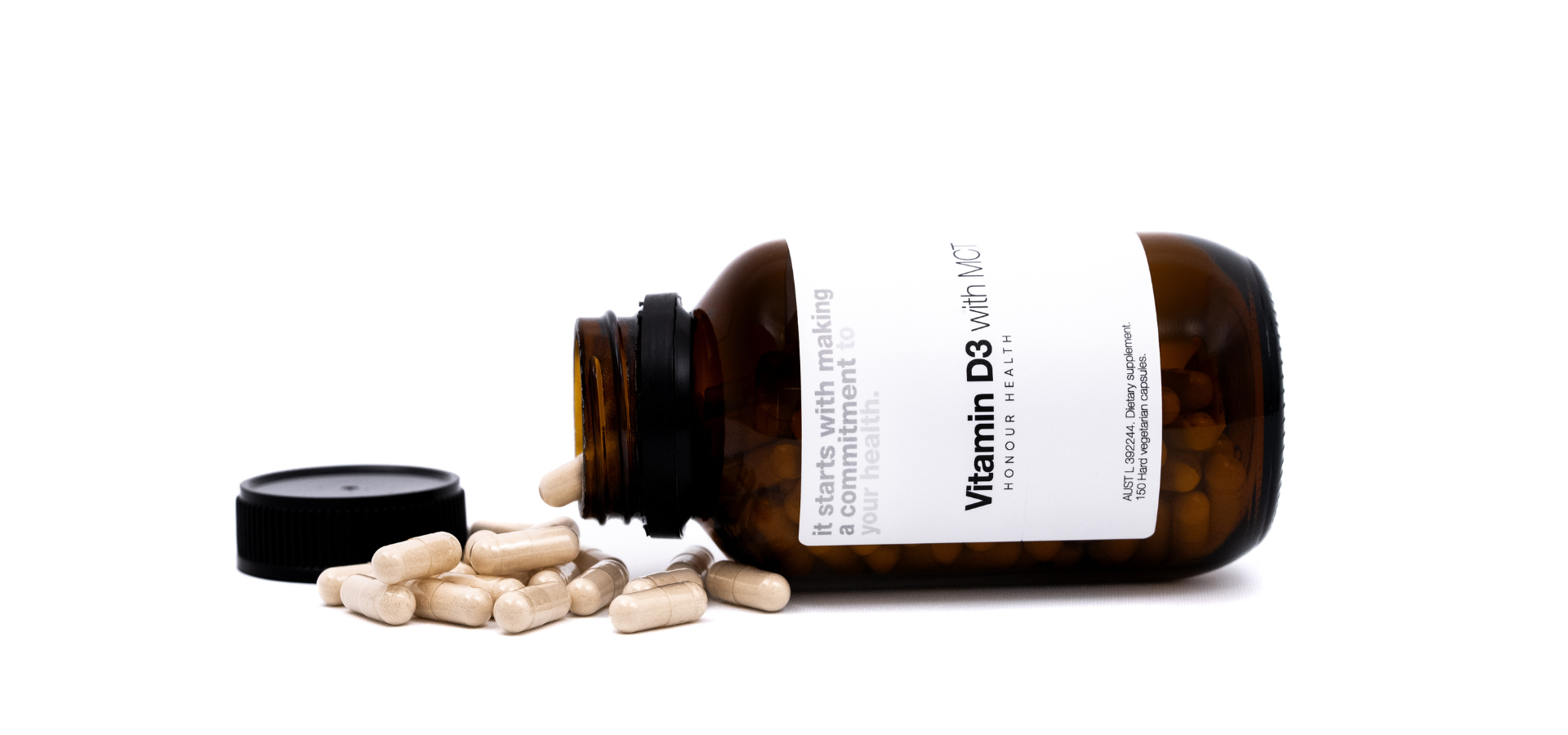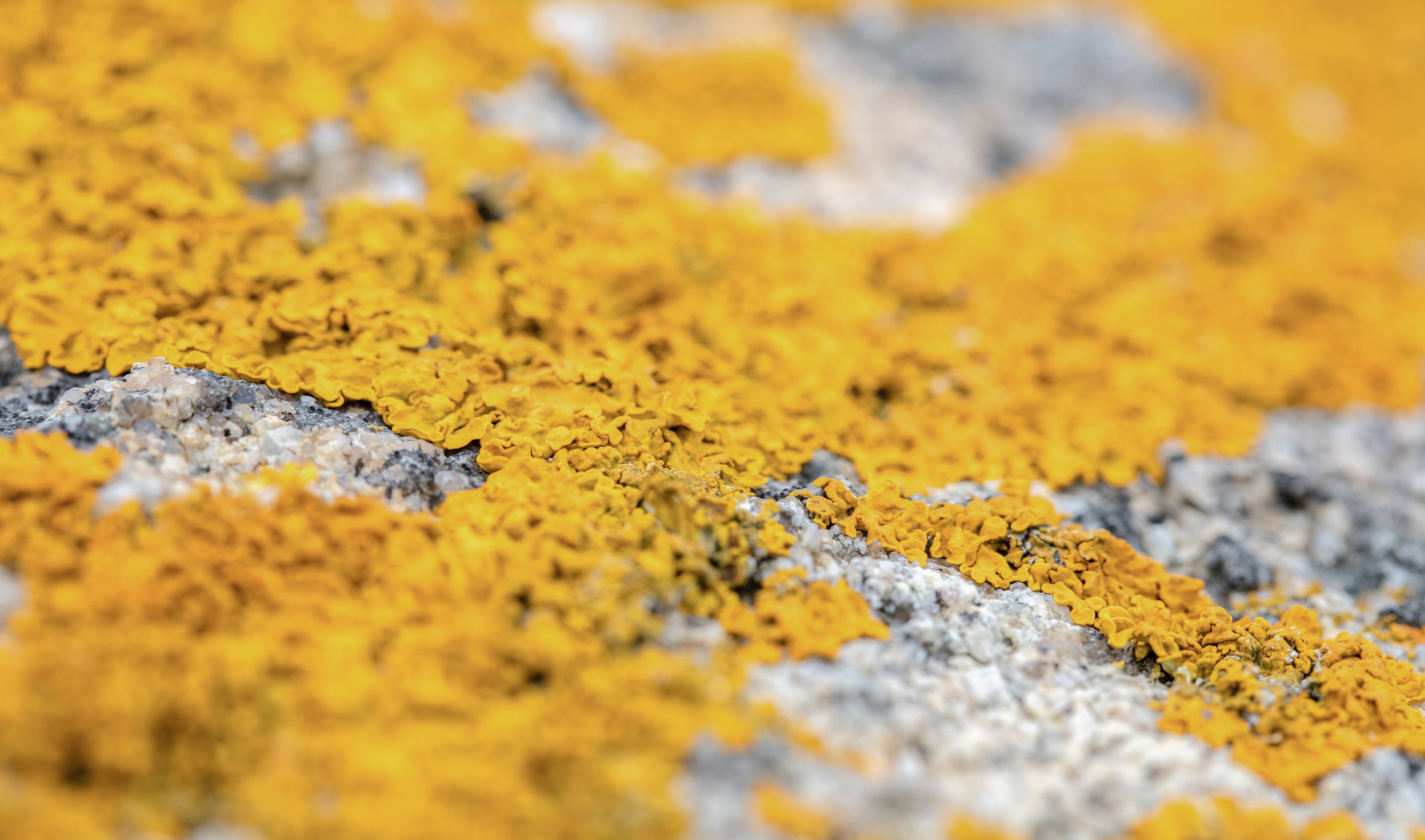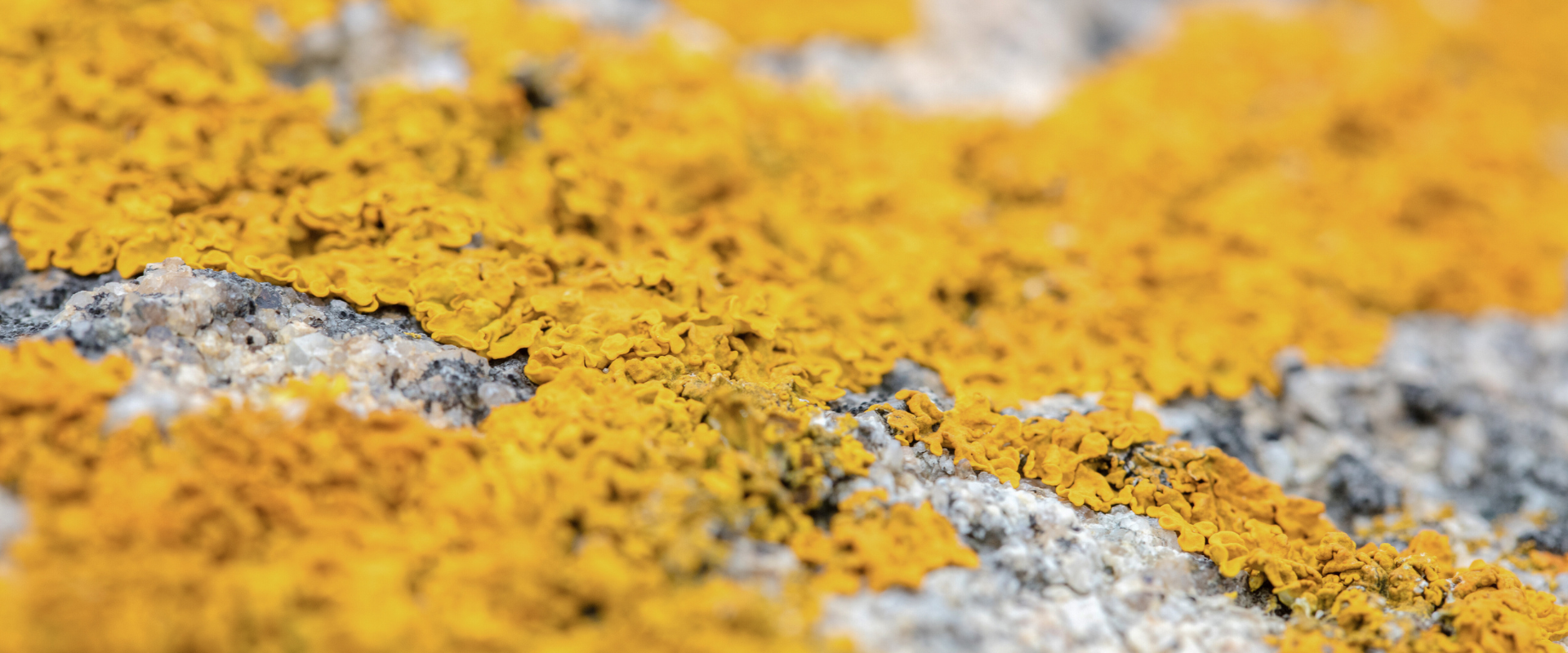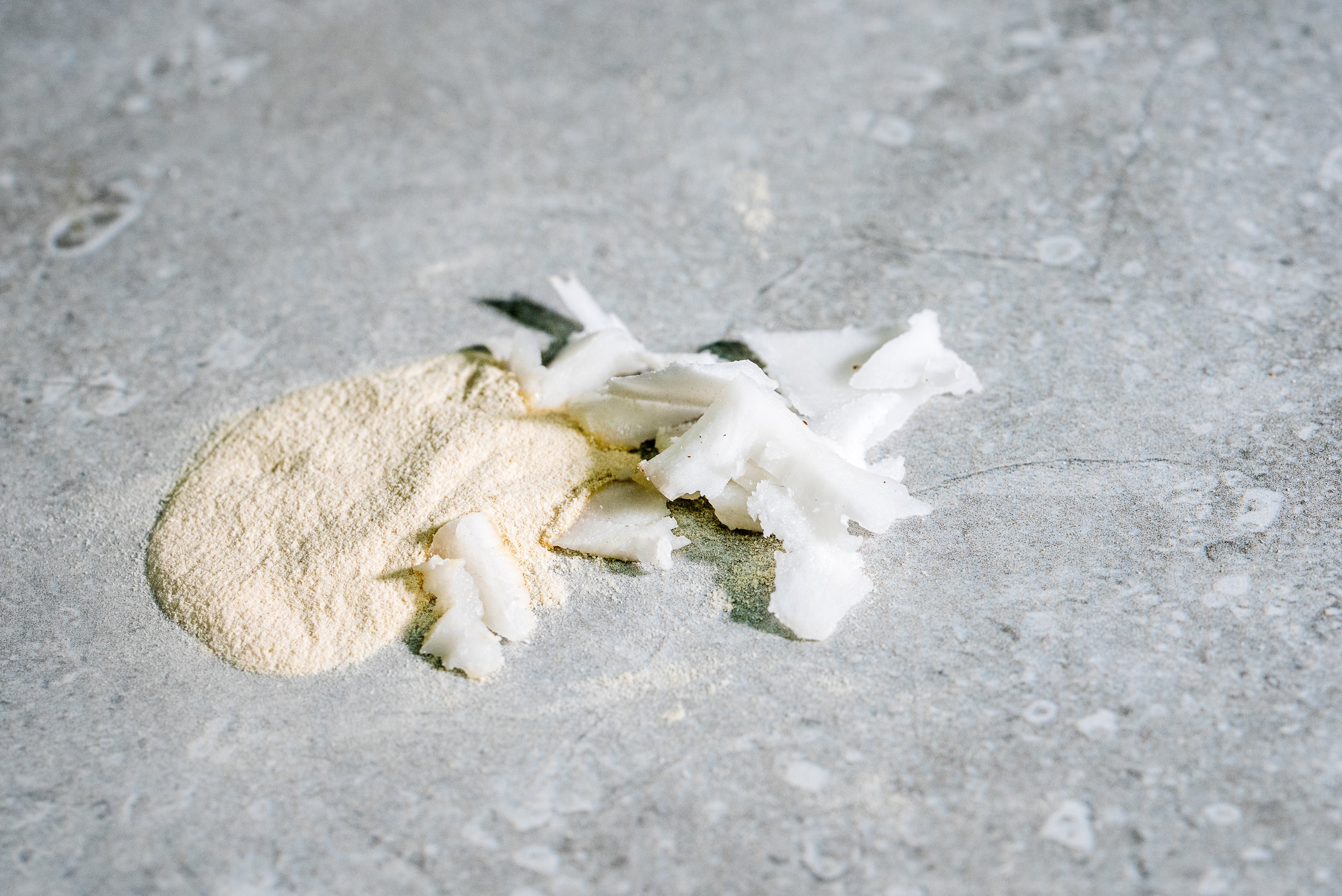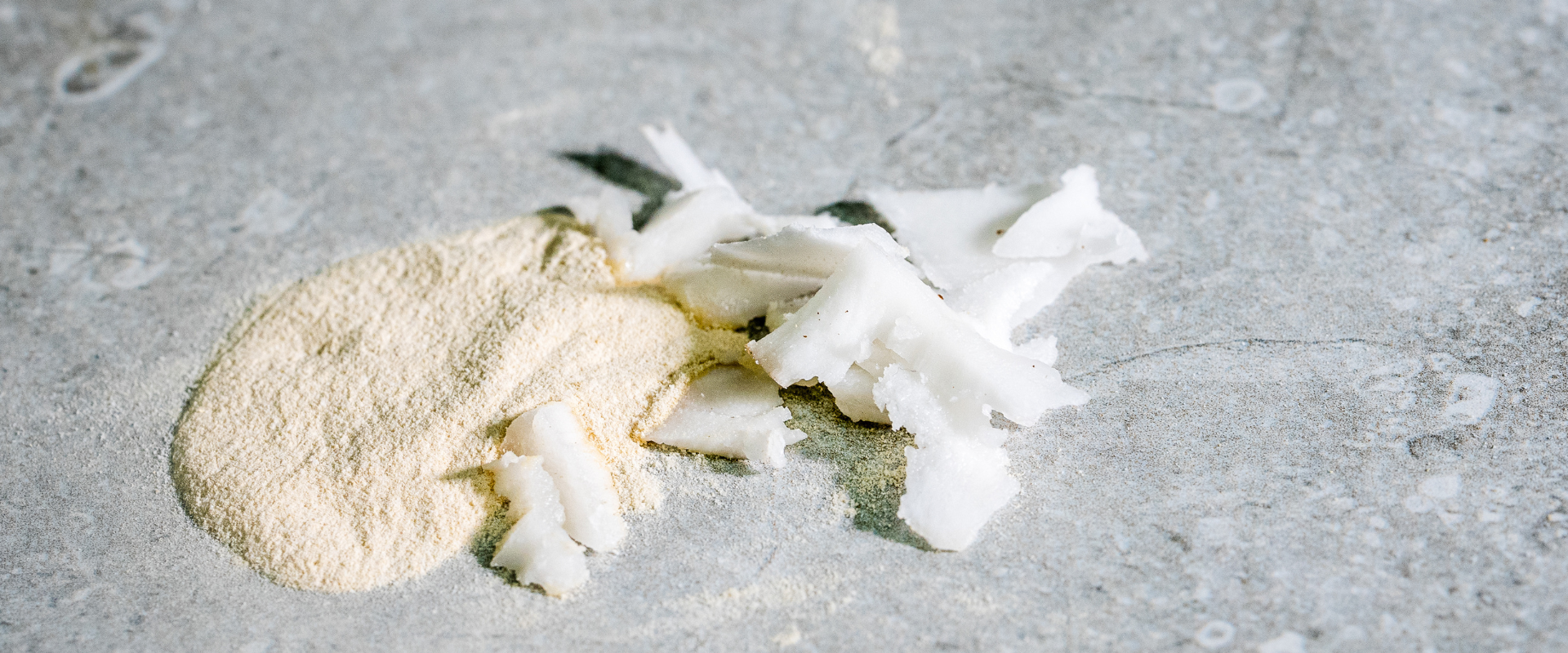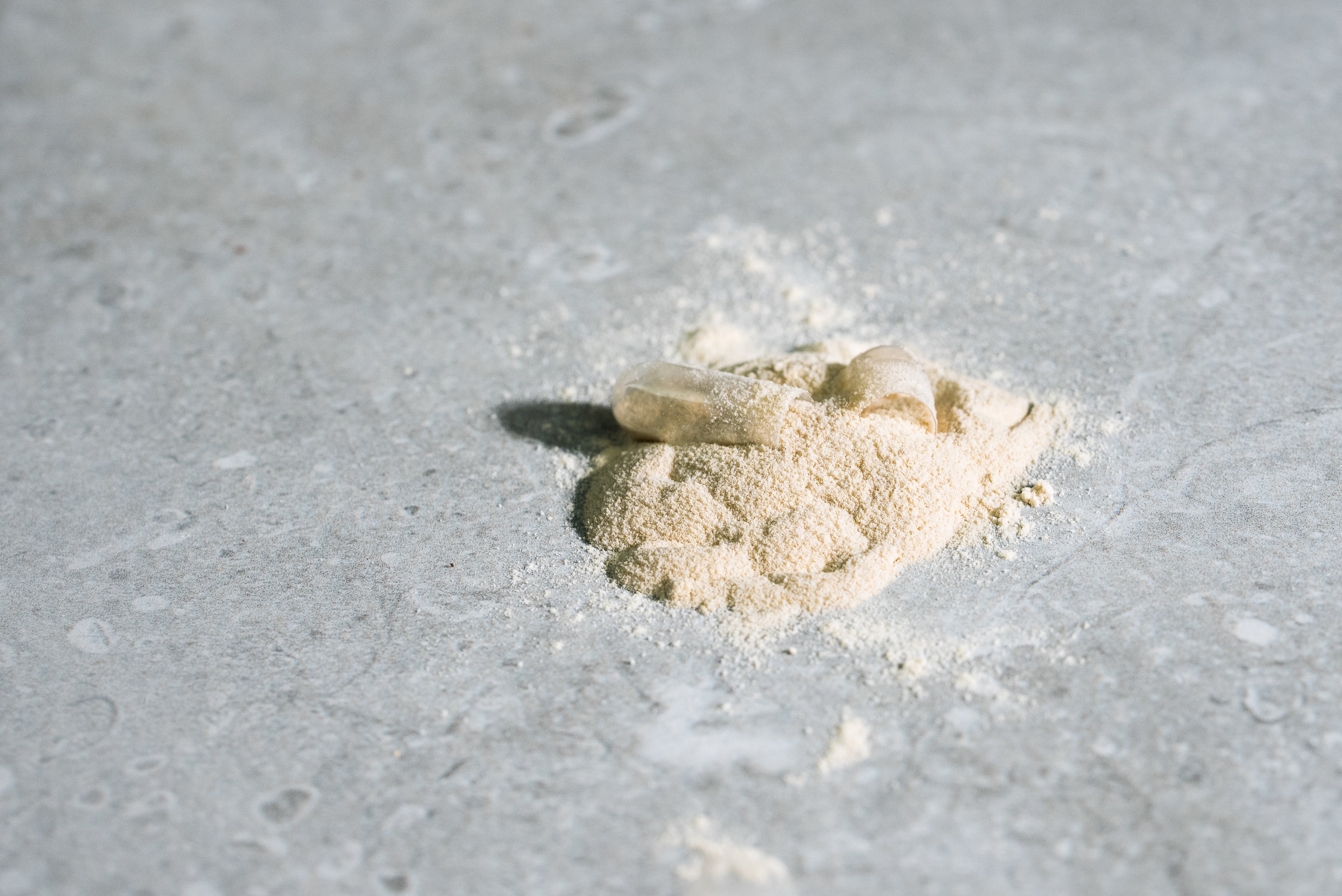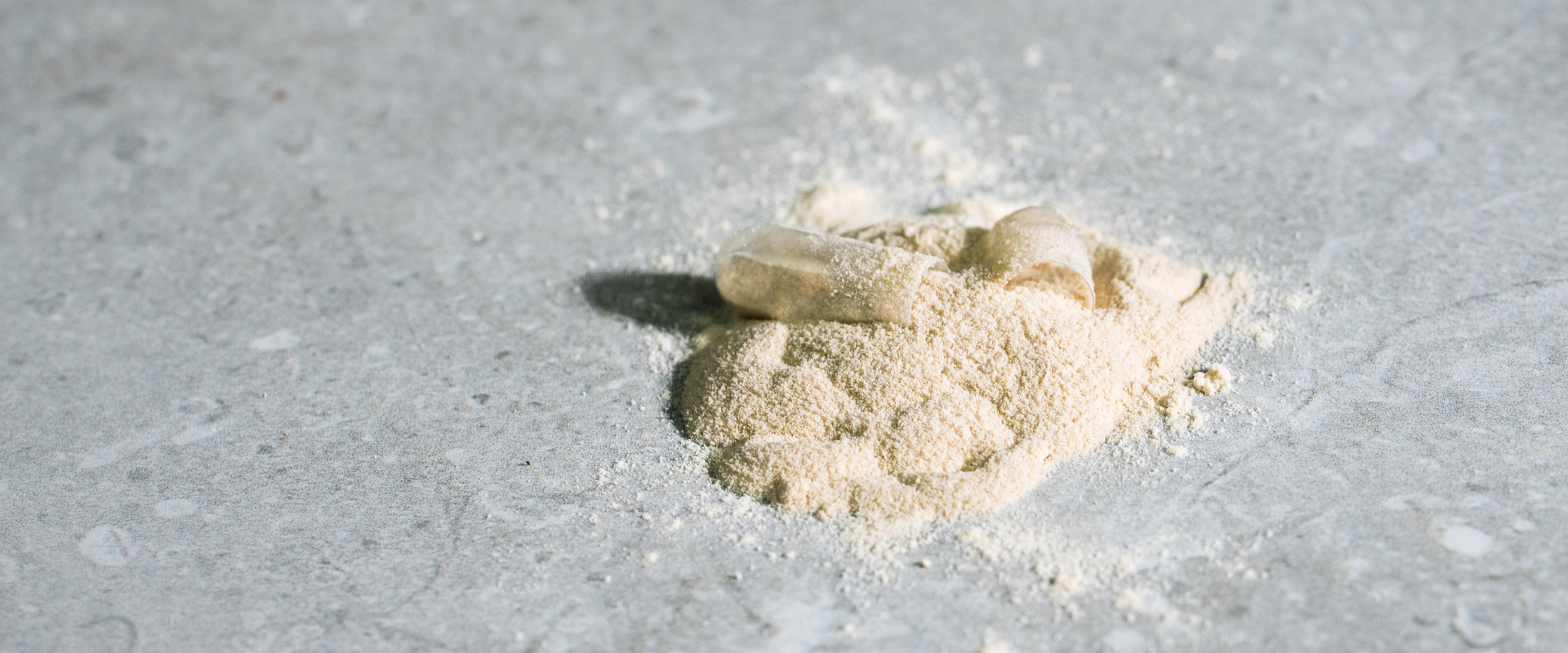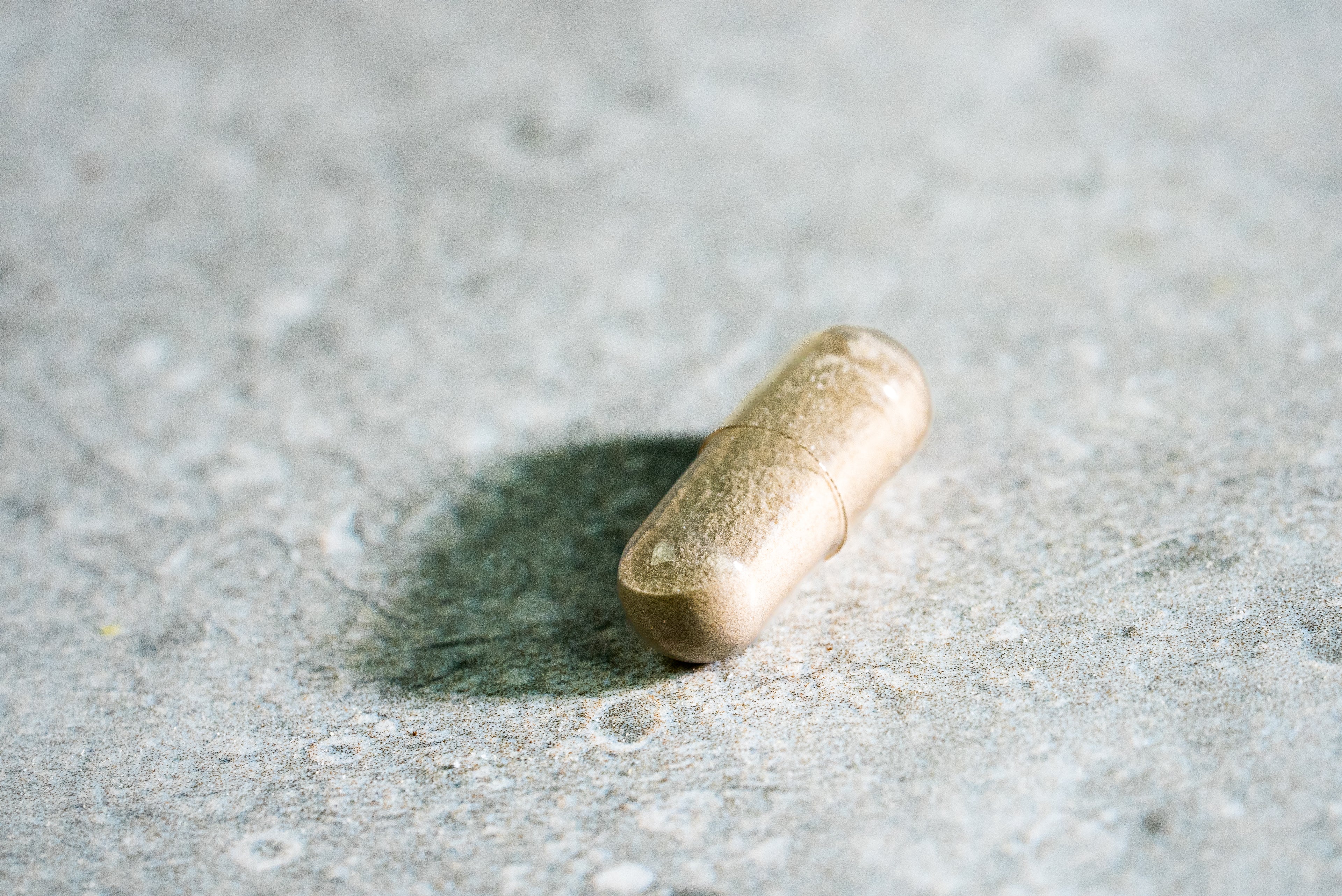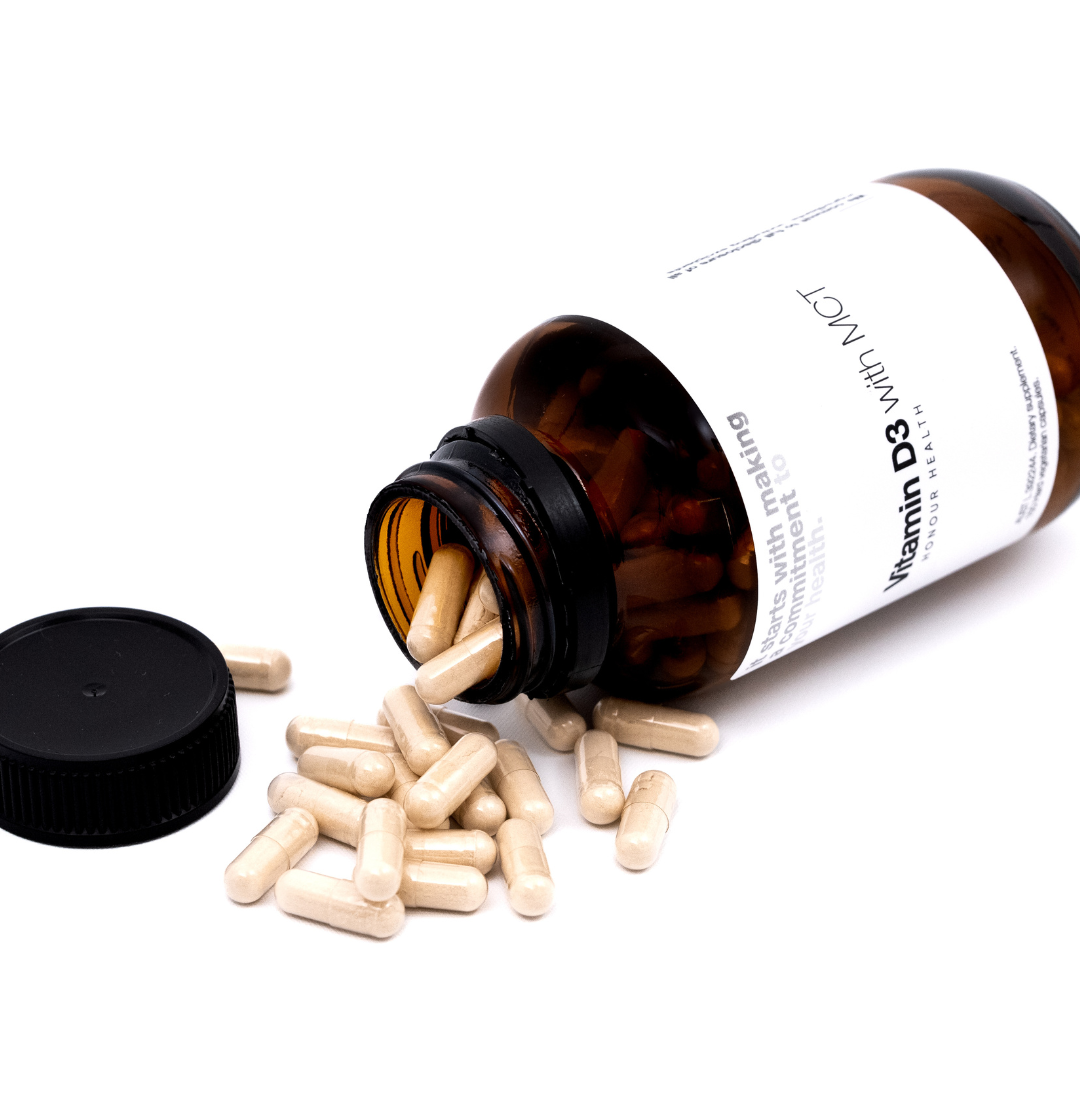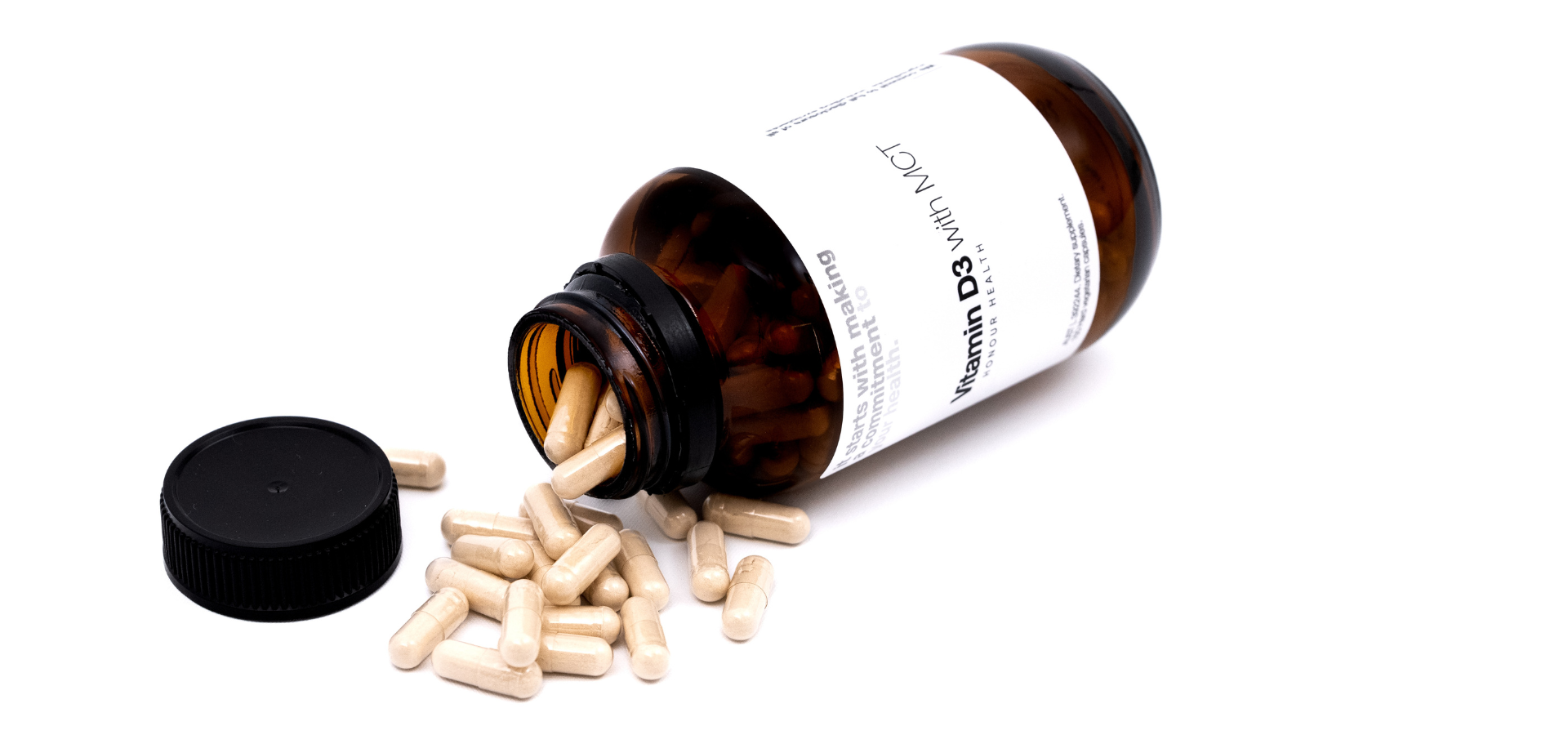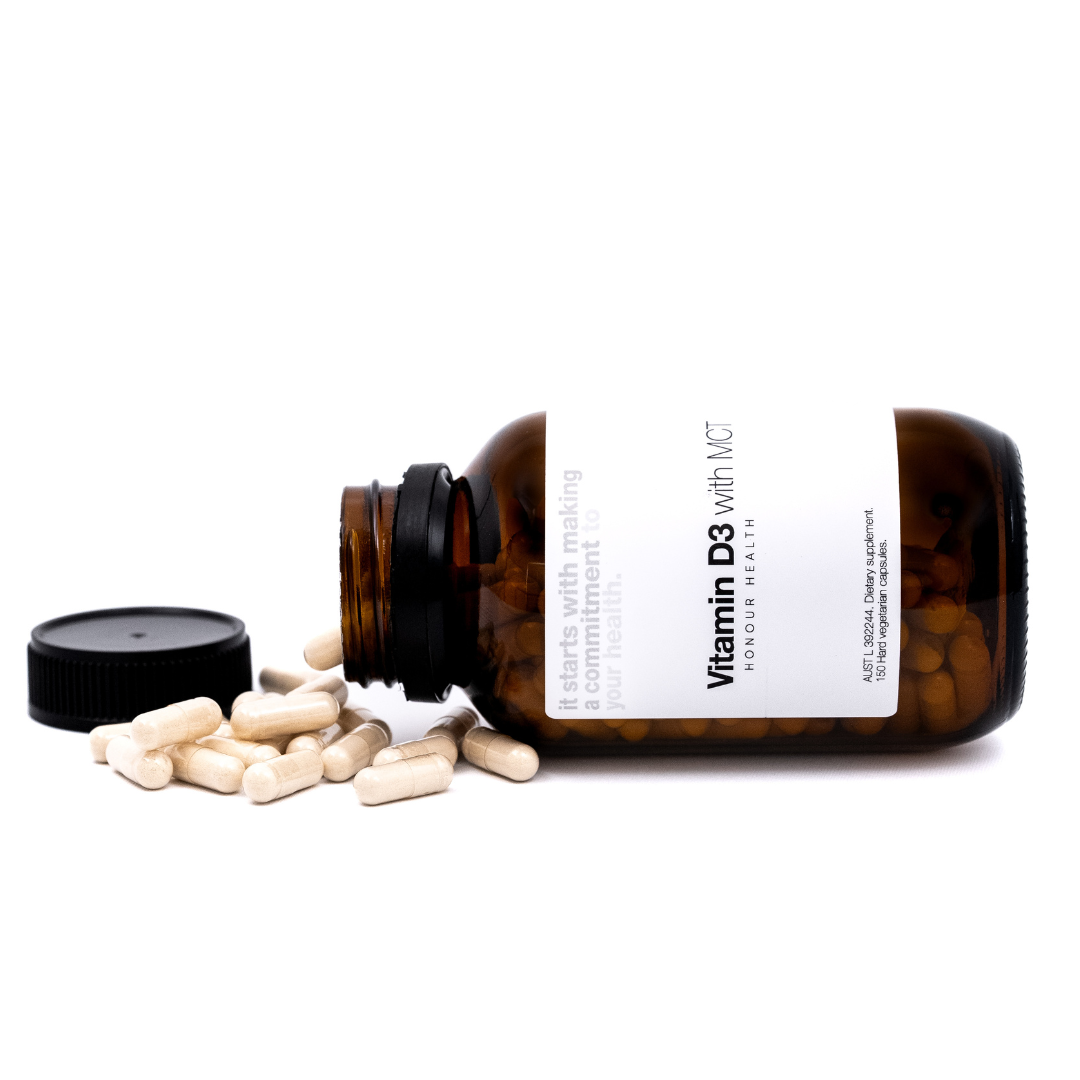
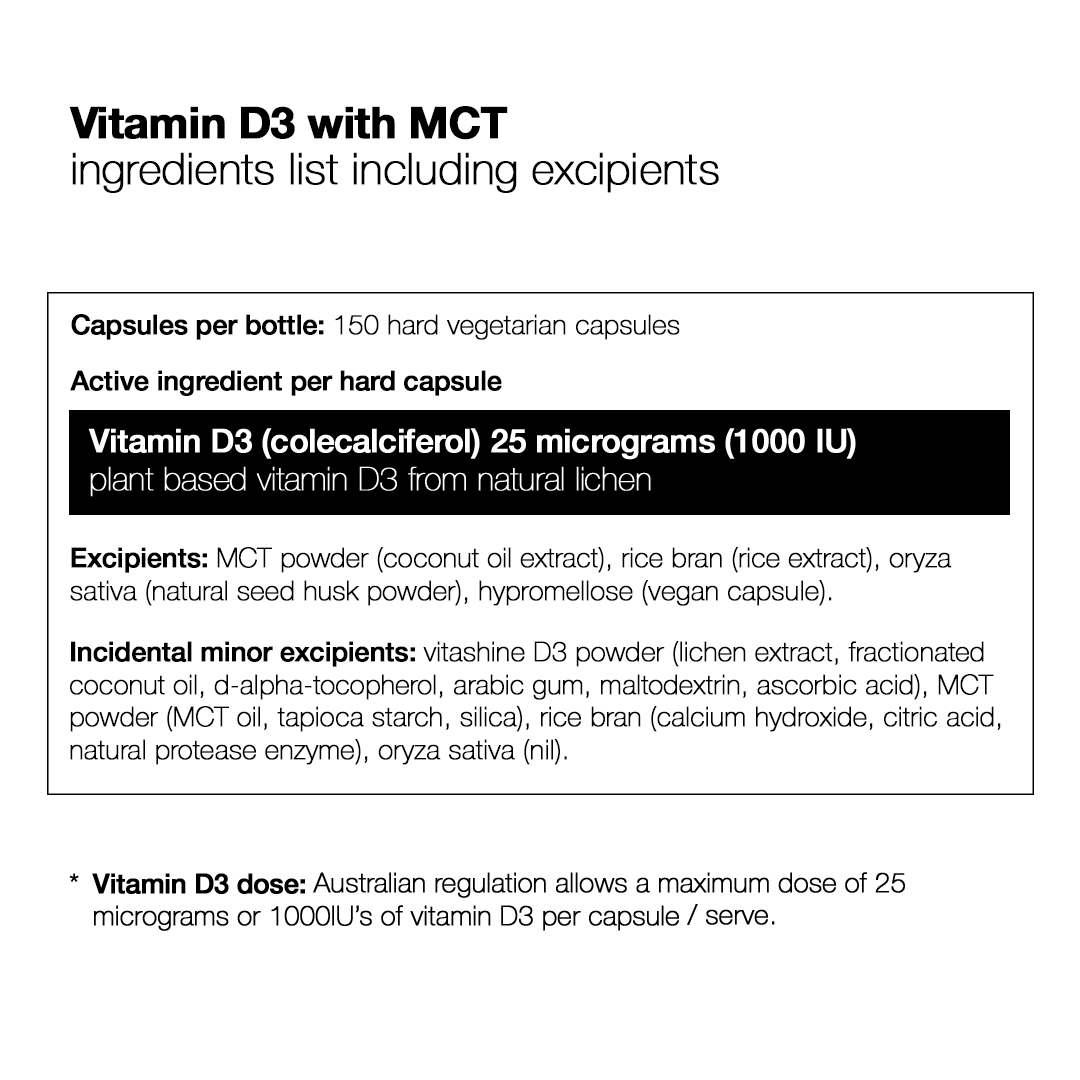

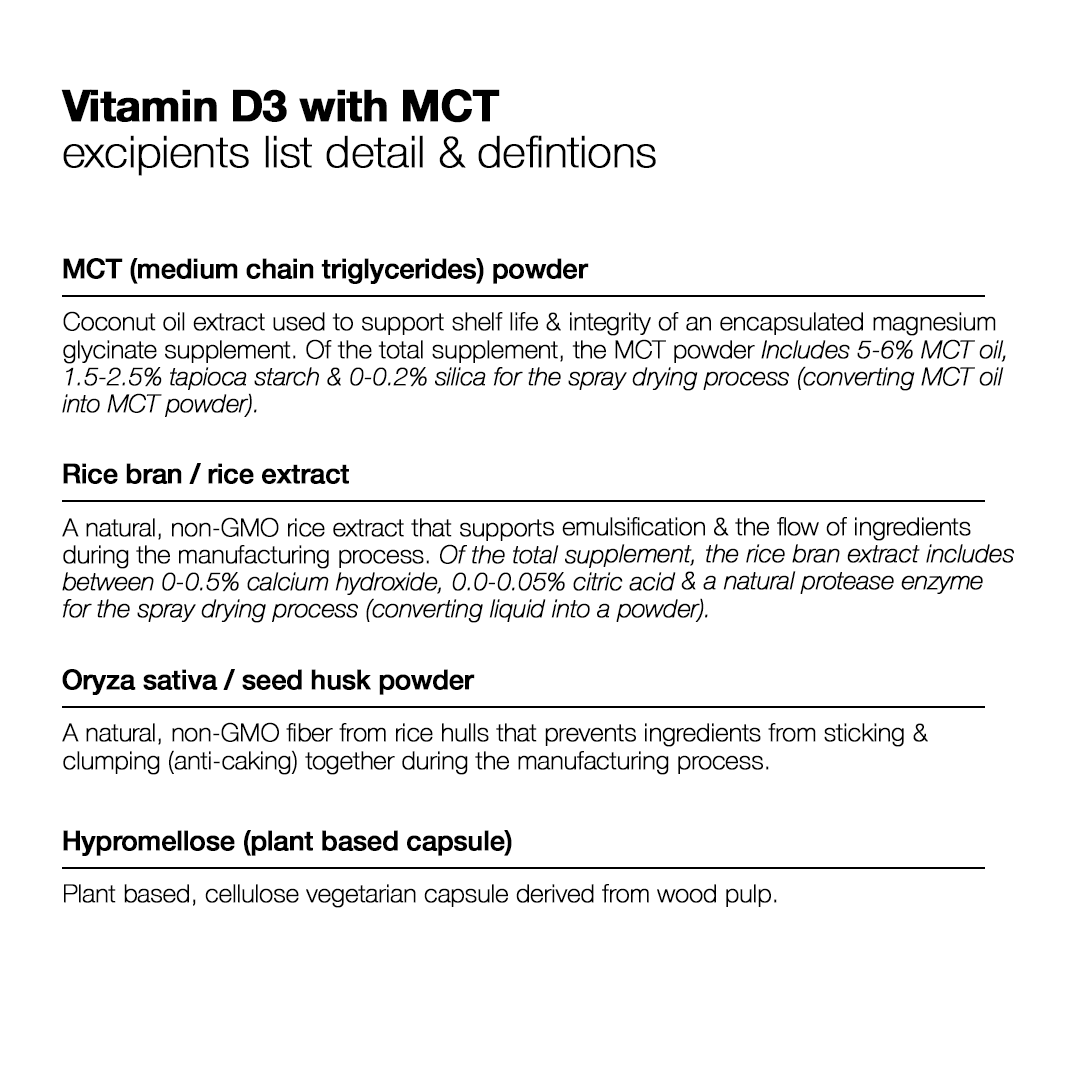
Honour Health Vitamin D3 with MCT
A cornerstone to living a long live in great health.
Well researched for its benefits on bone health, muscle health, muscle strength, immune system health, immune system function & overall health & wellbeing, Vitamin D is undoubtedly one of the cornerstones of human health & an absolute must for those looking to live a long life, in great health.
Why we need vitamin D3
Bone health
Vitamin D plays a key role in supporting the body's ability to absorb calcium, the primary building block of bones, from the diet.
Vitamin D aids in the mineralization process that strengthens & maintains bone integrity & helps regulate the balance of calcium and phosphate in the bloodstream, crucial for bone remodelling & health.
Muscle health & strength
Vitamin D receptors are found almost every single muscle cell in the body, influencing muscle strength, performance & overall muscle health.
Vitamin D aids in the transmission of nerve impulses to muscle fibers, essential for muscle contraction, mobility & the prevention of muscle weakness & atrophy, especially as we age.
Immune system health & function
Vitamin D acts as a powerful immune modulator by activating key cells that detect & fight pathogens.
The immune system is the body's primary defence against sickness & disease & by maintaining optimal levels of vitamin D, you can help support your body’s natural defences, promoting overall health & resilience against illness.
General health & wellbeing
Vitamin D is an essential nutrient supporting overall health health, way beyond just bones & muscles.
From immune system responses to influencing cognitive function & mood, by making sure you receive sufficient vitamin D, either through diet, sunlight, or supplements, you take an essential step towards maintaining a healthy, balanced lifestyle.
Clean & effective
Made from plants, not sheeps wool
Most Vitamin D supplements are made from lanolin, an oil based, wax substance derived from sheeps wool & commercial sheep farming.
We've developed our Vitamin D3 from lichen; a small unique plant species of fungus & algae. Vitamin D3 from Lichen is a new innovation, only recently having been discovered to share Vitamin D3 properties identical to lanolin & is the perfect substitue for those who are consciously trying to minimise their impact on animals & the environment.
Paired with MCT for improved absorption
For the body to properly absorb Vitamin D, Vitamin D supplements should always be taken with food & more specifically fat (Vitamin D is a fat soluable vitamin meaning it binds to fat molecules as it absorbs into the blood stream).
To ensure the maximum amount of Vitamin D absorbtion, we've paired our Vitamin D3 with the healthy fat MCT, a highly concentrated extract of coconut oil & well known for its energy producing, brain boosting health benefits in the body.
Microencapsulated powder instead of tablets or oil capsules
Most Vitamin D supplements come in either tablet form (with a solid, hard, smooth surface) or oil based soft gel capsules.
The issue with both of these forms is that they often require high amounts of additives, binders & fillers to ensure stability or supplement composition (for example, a hard tablet is mostly powder, bound & glued together to make a hard structure).
Our Vitamin D comes in powder form, microencapsulated in a vegan based, hard capsule made from hypromellose (a natural fiber) & purified water.
This allows us to encapsulate the highest quality Vitamin D without the need for unnecessary binders or fillers.
No vegetable oil fillers
Most Vitamin D supplements are filled with vegetable oils as the regulation allowed input of Vitamin D very small (see below). Therefore, most brands use cheap, commodity forms of vegetable oil to fill up their Vitamin D supplements.
As per Australian Regulation, 25 micrograms or 0.25 milligrams is the maximum amount of Vitamin D a single Vitamin D supplement can contain (this amount applies to hard tablets, soft gels & hard capsules - hard capsules being the method of encapsulation we prefer to use).
But what exactly does this mean?
The typical Vitamin D supplement size of most vitamin brands holds anywhere from 150 - 300 milligrams of 'ingredient mass' (the weight of the incredients in the capsule). If 0.25 milligrams (or less than 1%) is the maximum amount of Vitamin D a supplement company can use, what is making up the remaining 99% or 149.75 - 299.75 milligrams?
When regulation does not require excipients / additives to be detailed on the label, this makes it very hard to make an informed decision for the 'conscious consumer.'
Not only do we disclose every single ingredient in our Vitamin D, the majority of our ingredient mass comes from MCT powder (a 100% natural, food based coconut oil extract).
We then use two 100% natural rice based excipients (read more about excipients here) to support the manufacturing process & absolutely all ingredients are detailed on the label.
Plant based
The highest quality Vitamin D3 made from lichen, not sheep's wool. All the benefits of Vitamin D with zero impact to animals.
Paired with MCT for maximum absorption
Plant based Vitamin D3 paired with the brain boosting, energy producing, healthy fat from coconut oil MCT (medium chain triglycerides) for maximum absorption & bioavailability.
Microencapsulated
We never use binders & glues often required to manufacture hard tablet supplements. Instead we choose microencapsulation; Vitamin D3 powder cleanly produced & enclosed in a plant based capsule.
No vegetable oil fillers
Every ingredient must serve a purpose to positively impact our health. It is our view that vegetable oils found in many oil based Vitamin D3 supplements, do not positively impact our health & in actual fact, may be causing significant harm & bodily stress.
Impacts of not getting enough vitamin D
LOSS OF BONE DENSITY
As Vitamin D is directly correlated with maintaining healthy bone mass, Vitamin D deficieny & low circulating blood Vitmain D levels can potentially lead to a decrease in overall bone density.
Healthy bone density is depandant on a range of factors, including sufficient Vitamin D levels. Therefore, low bone density can lead to an increased risk of bone fractures, breaks & in the more extreme circumstances, the onset of osteoporosis (a chronic bone disease characterised by low bone density & bone mass).
FEELINGS OF FATIGUE & LOW ENERGY
Do you ever experience random periods of fatigue or lower than normal energy levels? You could potentially be experiencing a common symptom of low Vitamin D levels.
Studies have shown a potential relationship between maintaining sufficient Vitamin D levels & a persons likelihood of experiencing fatigue or lower than normal energy levels throughout the course of their day.
DECREASE IN MUSCLE SIZE, STRENGTH & HEALTH
As Vitamin D is directly correlated with the maintenance & support of muscle size, strengh & overall muscle health, the opposite can also be true.
Low Vitamin D levels are known to have a potential impact on the quality of an individuals skeletal muscle, in particular for people with darker skin types or where access to sunlight is limited.
This is definetely a factor to keep in mind if you're someone who frequently training indoors.
WEAKEND IMMUNE SYSTEM
The immune system defends the body from foreign, invading organisms.
Studies have shown a potential relationship between Vitamin D levels & whether an individual has the ability to fight off, defend & protect itself from a range of different immune conditions, infections & disorders. The importance of having a strong immune system is potentially something we've become more aware of in the past 3 years, than ever!
How to take vitamin D3 with MCT
Vitamin D is a fat soluble vitamin, meaning it absorbs into the body with fats, specifically from food & we recommend supplementing early in the day, with breakfast.
If you incorporate fasting into your daily health routine, supplement with your first meal.
Always refer to the label for product specific directions & warnings.
FAQs
WHAT IS LICHEN?
Lichen is a type of composite organism that is made up of a symbiotic relationship between a fungus & an alga or a cyanobacterium.
Lichens come in a variety of shapes and colors & are usually found in areas with limited nutrients and moisture, such as rocks, tree bark & soil.
They are an important component of many ecosystems, providing food for small animals & helping to break down dead organic material.
Most importantly though is lichen has recently been discovered to share Vitamin D3 properties identical to lanolin, te more traditional form of Vitamin D3 & is the perfect substitue for those who are consciously trying to minimise their impact on animals & the environment.
WHAT IS COLECALCIFEROL?
Colecalciferol & Vitamin D3 are the same thing with Colecalciferol being the scientific name for Vitamin D3.
Colecalciferol is the most active form of Vitamin D & is the form that is most commonly used in dietary supplements & to treat Vitamin D deficiency.
WHAT IS THE DIFFERENCE BETWEEN VITAMIN D3 & VITAMIN D2?
Vitamin D3, also known as colecalciferol, is a type of Vitamin D that is synthesized in the skin when it is exposed to sunlight.
Vitamin D3 is the form of Vitamin D that is most active in the human body & is thought to be more effective at raising vitamin D levels than vitamin D2.
Vitamin D2, also known as ergocalciferol, is a form of Vitamin D that is found in some foods and dietary supplements.
Vitamin D2 is not as effective at raising Vitamin D levels in the body as Vitamin D3 & is not the preferred Vitamin D supplement recommened for overall health.
WHAT IS MCT OR MEDIUM CHAIN TRIGLYCERIDES?
MCT, or medium chain triglycerides, is a type of fat often found in coconut oil & other plant-based products.
It is a type of saturated fat that is easily digested, absorbed by the body & is often used as an energy supplement, particuarly for its benefits on the brain.
MCTs are a type of healthy fat & can also be used to increase satiety & reduce hunger.
WHY DOES OUR VITAMIN D CONTAIN MCT?
Vitamin D is a fat-soluble vitamin, meaning that it absorbs most effectively when it is taken with food & more specifically, fat.
By pairing Vitamin D with medium chain triglycerides (MCT) a type of healthy fat known for its benefits on energy & performance, we ensure that our Vitamin D is positioned for maximum absorption in the body.
Eating foods that contain fat, such as fish, eggs, dairy products & medium chain triglycerides or MCT's can help increase the absorption of Vitamin D.
SHOULD VITAMIN D BE TAKEN WITH FOOD?
Yes, it is best to take vitamin D with food, specifically foods higher in healthy fat such as fish, egg yolks, cheese & fortified foods. Taking vitamin D with a meal that contains fat can help your body absorb it more effectively.
WHAT DOES MICROENCAPSULATED MEAN?
Microencapsulation is a process in which small particles are surrounded by a coating or shell. This coating can be made from a variety of materials, including polymers, lipids, proteins & carbohydrates.
The coating serves to protect the particles from external elements such as air, light & moisture. It can also protect the particles from chemical or biological degradation & it can be used to control the release rate of the particles.
Microencapsulated supplements (such as our Vitamin D3 with MCT) are dietary supplements that have been encapsulated in tiny capsules or beads that are typically no larger than 1-2 millimeters in size.
This process helps to protect the supplement from oxidation & other environmental elements, preserve its potency & even help to mask its taste.
Microencapsulated supplements are particularly useful for those who have difficulty swallowing or cannot tolerate the taste of certain supplements & are also less likely to require less exipients than other supplement forms such as hard tablets.
WHAT ARE EXCIPIENTS?
Excipients are inactive ingredients used in the production of vitamins & supplements that act as a vehicle for the active ingredients & support production & manufacturing.
Examples of excipients include all natural flowing agents & lubricants however they can also include binders, fillers, glidants, flavorings, colorings & preservatives.
WHAT DOES BIOAVAILABILITY MEAN?
Bioavailability is a term used to describe the amount of Vitamin D that enters the bloodstream when taken as a supplement.
It is a measure of how much of Vitamin D reaches its intended target in the body & can be affected by factors such as the route of administration, the formulation & individual variations in metabolism.
WHY IS VITAMIN D OFTEN CALLED THE SUNSHINE VITAMIN?
Vitamin D is known as the "sunshine vitamin" because it is produced in the body in response to sunlight.
Vitamin D is converted in the body through a process called hydroxylation.
This process occurs in two steps.
First, the liver converts vitamin D from sunlight into 25-hydroxyvitamin D. T
hen, the kidneys convert 25-hydroxyvitamin D into 1,25-dihydroxyvitamin D (calcitriol), which is the active form of vitamin D in the body.


